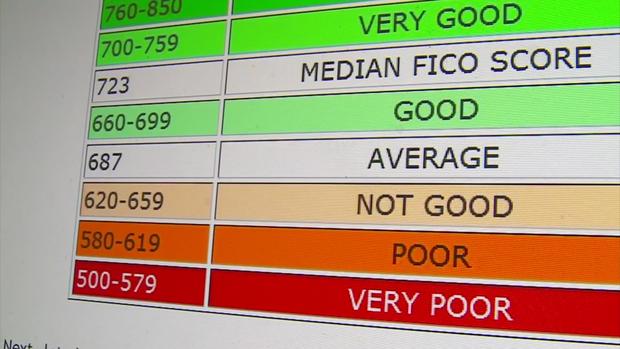Good Question: What Goes Into Determining Credit Scores?
MINNEAPOLIS (WCCO) -- Starting July 1, people could see a change in their credit score.
Credit reporting companies will have tougher rules on collecting public records, which could mean civil judgments or tax liens will not be factored into the score equation.
So, what does go into determining a credit score?
A credit score is a three-digit number that ranges from 350 to 850. It's calculated from information in a credit report and is supposed to determine the risk of whether a person will or won't repay a loan.
Landlords, banks, mortgage lenders, credit card companies, utilities and even potential employers use them.
"Everybody has to do two things to have good credit scores," said Rod Griffin, the director of public education for Experian, one of the three major credit reporting companies in the U.S. "You have to pay your bills on time every single time and you have to keep your balances on your credit cards as low as possible."
Griffin says paying bills on time accounts for 30 to 40 percent of a score. The percentage of credit limit a person uses accounts for 30 percent to 35 percent.
Griffin recommends keeping that under 30 percent of your credit limits.
He says about 20 percent of the credit score calculation is the different types and age of the credit.
According to the credit-scoring company VantageScore, it's helpful to maintain a mix of accounts -- mortgage, auto, credit cards -- over time.
Read More: How To Boost Your Credit Score With Your Credit Card
Recent history contributes about 15 percent of the score, according to Griffin. That's information like recent openings and closing of accounts. Closing an account can bring down available credit, which can affect a person's credit utilization rate.
The final 3 percent or so is other debt, beyond credit cards, mortgage or auto loans.
Griffin says an individual checking his or her own credit won't change a score, but a lender checking credit could. He says the scores usually bounce back quickly once it's determined how a person might use that credit.
"That inquiry does represent potential risk because there's no new debt yet showing on the credit report," Griffin says.
Your credit report information can differ from agency to agency. That's because lenders can update information to the agencies at different times and each agency might use a different way of scoring.




